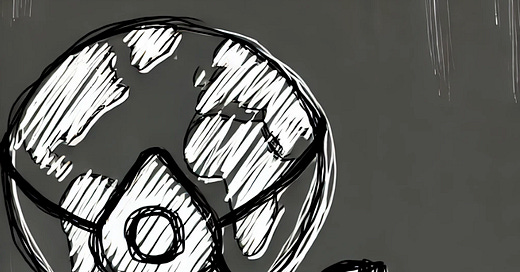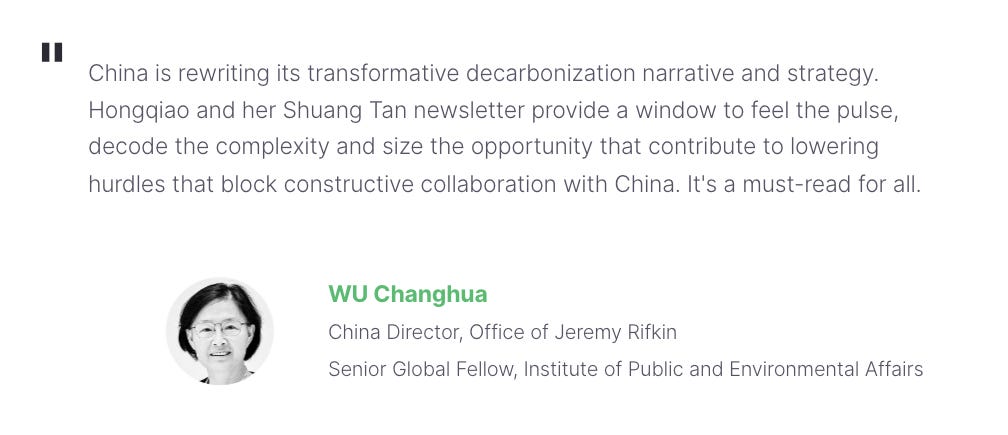#22: Why It’s Sometimes Hard to Care for the Climate
A Shanghai sustainable living advocate reflects on planetary health after two months caring for her critically ill father during a scorching summer.
This summer, numerous regions, including China, experienced record-breaking heatwaves. As highlighted in our last newsletter, documenting these increasingly frequent extreme weather events is becoming nearly impossible for journalists in China. Meanwhile, on the receiving end, unless – and until – directly affected by such events, many people tend to avoid repetitive negative news.
The lack of reliable survey data makes it difficult to understand the reasons behind the public’s indifference or how the absence of science-based, timely, and human-centered climate information influences everyday decision-making.
The limited surveys on Chinese citizen’s climate awareness often draw contradictions. Depending on the survey provider, the year, and the population surveyed, conclusions range from strong or weak climate awareness to the elderly experiencing higher climate anxiety or youth being aware but inactive. Incompatible methodologies make comparison difficult.
“Do Chinese people care about climate change?” I’m often asked, and even experts in the China climate community demand an answer. Snapshotting the views and actions of 1.4 billion people, spread across 9.6 million square kilometers with varying levels of education, income, and media literacy, is impossible. More importantly, what does “caring for climate change” even mean?
In this week’s newsletter, Shanghai-based social entrepreneur Jing Feng shares how her father’s sudden illness this summer put her advocacy of sustainable lifestyles on the back burner in favor of the conveniences of food delivery, ride-hailing, and online shopping.
China has the world’s biggest online commerce market. In 2020 alone, food delivery generated 1.6 million tons of plastic trash, accounting for 3% of China’s total municipal solid waste. Without doubt, the over 400 million customers of China’s food delivery industry are actively contributing to climate change, environmental pollution, and biodiversity loss through their daily consumption behaviors. But does that mean they are simply unconcerned about climate change?
Support Shuang Tan
Shuang Tan is an independent initiative dedicated to tracking China’s energy transition and decarbonization. The newsletter is curated, written, and edited by Hongqiao Liu.
Or, as Jing reflects, when people are in “survival mode,” overwhelmed by immediate concerns, they don’t have additional bandwidth for climate change, even as this seemingly distant and abstract notion is already shaping their lives. Jing’s preoccupation was her father’s illness; for others, it could be financial strain, time poverty, or political depression.
The danger of short-term thinking and action is that we risk losing the critical window to break free from this vicious cycle. Armed conflicts, geopolitical turmoil, and amplified social inequality should not serve as excuses to delay climate action. Instead, efforts to preserve planetary health should be embraced as opportunities for building peace, fostering dialogue, and driving reform.
Jing Feng: Don’t Wait Until the ICU to Care About Your Health – Or Our Planet
A Shanghai sustainable living advocate reflects on planetary health after two months caring for her critically ill father during a scorching summer.
Written by Jing Feng
Edited by Hongqiao Liu
July 21, 2024, Urumqi. At 7 a.m., my day began with the steady hum of breathing equipment from my father’s room. The care worker was carrying out a urine bottle while my mother, already up for some time, was in the kitchen preparing breakfast. I silenced my alarm and went straight to work, organizing my father’s dozens of daily pills.
The following three days turned out to be the hottest on record. Earlier that week, my father had been discharged from the ICU after a month fighting a severe lung infection whose cause doctors could not find. His diabetes, combined with lungs weakened by an earlier COVID-19 infection, left him critically vulnerable.
Before his return home, I scrambled to install an air conditioner. Built in the early 2000s, our apartment lacks proper insulation, and turns into an oven during heatwaves. His oxygen concentrator, running 24/7, only added to the oppressive heat. For my mother, cooking in the kitchen – the hottest corner of the house – was torture. But we weren’t the only family vying for precious installation slots. In Urumqi, a city farther from the cooling effect of the ocean than any other and where the summer temperature record stands at 42.6°C (108.7°F), air conditioners have become highly coveted. Securing one amid fierce demand felt like a small yet important victory not just for our comfort, but for my father’s survival.
My usual preoccupation with environmental and climate issues faded. Still, in quiet moments, I couldn’t help but wonder: how many others were living on the edge, just one power outage away from tragedy?
2,500 kilometers away in Shanghai, where I’ve been living since 2013, I am a social entrepreneur, advocating for sustainable living. I also host “Road to Tomorrow,” a popular Chinese-language podcast where I discuss how people can change their everyday lives to help build a sustainable future. But my father’s condition forced me to confront the climate crisis on a deeply personal level.
At 63, he had become part of the population most vulnerable to its impacts. Today, his survival depends on a stable electricity supply. If the power went out – air conditioning overwhelming power generators is a seasonally recurring threat in China – he would quickly lose access to the oxygen that keeps him alive. To prepare for the worst, I bought a 40-liter oxygen tank. The tank, the largest I could find, cost 1,000 yuan ($140), and can keep him breathing for 40 hours in case of a blackout.
During those two months of caring for him, my life narrowed to focus solely on his survival. My usual preoccupation with environmental and climate issues faded. The constant stream of negative news – floods, wildfires, heatwaves – became overwhelming, and I instead distracted myself with funny videos. Still, in quiet moments, I couldn’t help but wonder: how many others were living on the edge, just one power outage away from tragedy?
My commitment to sustainable living collided with the harsh demands of caregiving. Usually championing reduced consumption and sustainable living, I found myself relying on cars, take-out, and online shopping more than I ever had before. I knew the environmental and social costs, but when survival was at stake, convenience took precedence. Every day became a battle to get through the immediate challenges.
I even started to try to put my mother, a frugal teacher, at ease as we watched the ICU bills eat into their modest retirement savings, telling her, “If money can fix it, then it’s not really a problem.” It was only half true. Fortunate to have been able to afford health insurance, and fortunate that I had not bought a Shanghai apartment for which I’d had to rely on their help, we could pay my father’s medical bills. But any future setbacks could break our budget, and, in any case, money alone wouldn’t make him better. It made me realize climate change is much the same, instead that the finances to fight that crisis are entirely inadequate.
My commitment to sustainable living collided with the harsh demands of caregiving. Every day became a battle to get through the immediate challenges.
The two-month caregiving experience in Urumqi pushed me out of my comfort zone and made me question the accessibility of sustainable living. I started to see it as a privilege reserved for the middle class – those with the financial means to choose it. Sustainable choices require a safety net, something not everyone has, especially those who are still fighting to survive.
Health and climate vulnerabilities are deeply intertwined. The UN reports that heat-related deaths among people over 65 have increased by 85% over the past 20 years. In China, studies have shown that during heatwaves, respiratory infections rise by 30%. Globally, more than 70% of the workforce is exposed to extreme heat risks, including the delivery workers who have become essential, especially during health crises.
As WHO Director-General Tedros Ghebreyesus has stated, “The climate crisis is also a health crisis.” Yet, like my family did, most people only grasp the severity of a crisis when it’s too late. Whether it’s human health or planetary health, we can’t afford to wait until we’re in the ICU.
Like my family did, most people only grasp the severity of a crisis when it’s too late. Whether it’s human health or planetary health, we can’t afford to wait until we’re in the ICU.
I fear that by the time the climate crisis reaches its tipping points – and we’ve already surpassed many – we’ll be forced into survival mode, turning to controversial solutions like geoengineering or nuclear energy as desperate fixes rather than addressing the root causes when we still have the chance.
Just as we all understand that it’s important to prevent diseases, we must take care of the planet before the damage is irreparable. While individuals can make sustainable lifestyle changes to reduce their environmental footprint, society as a whole must invest in disaster preparedness, climate mitigation, and adaptation.
This summer, my father came so close to death. A month after leaving the ICU, he’s only just starting to walk again. Even a minor illness – or a short power outage – could set back his fragile recovery.
Our planet is just as vulnerable. The actions humanity is taking today are not sufficient to halt global warming, let alone reverse its damage. I hope that my father continues to heal, and that I can live healthily on a flourishing planet.
Get in touch
I hope you enjoy this newsletter. Share your thoughts in the comments. If you’d like to write for Shuang Tan, republish our articles, or submit a testimonial, email us at contact@shuangtan.me.
We will soon start accepting submissions. Stay tuned for our pitch guide!
For feedback, inquiries, and funding opportunities, please write to contact@shuangtan.me.
Until next week,
Hongqiao




